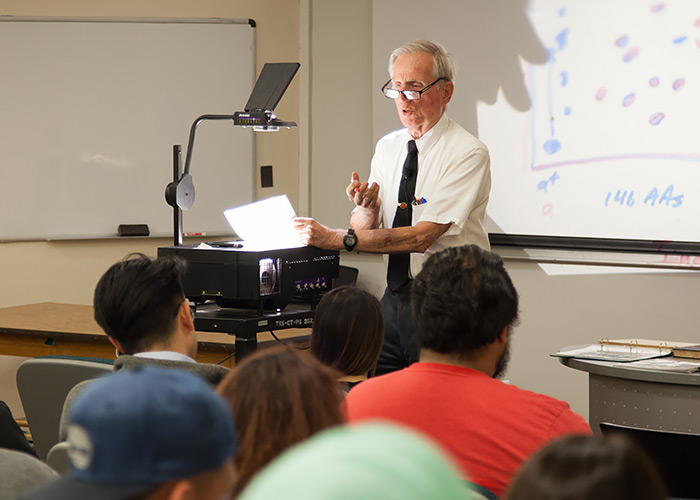Developed Human Genetics Course, Served as Director of the UH Honors Program
After 57 years of teaching and research, Philip Snider, associate professor of biology in the University of Houston’s College of Natural Sciences and Mathematics, is teaching his last semester of BIOL 3341 - Human Genetics, a course that he designed and implemented in 1972. He has taught this class ever since, updating and changing the curriculum every year to keep up with the rapid pace of discoveries.

Dr. Philip Snider, associate professor of biology, lecturing for BIOL 3341 – Human
Genetics, which is a course that he developed. Snider is retiring after 57 years of
teaching and research.“Human genetics is just unbelievable these days,” Snider said. “Now that scientists
have sequenced the human genome and are identifying what all these genes do, they
are now in the process of developing personalized medicine, taking a person’s individual
genes into account to identify the therapies that will work best for them.”
The curriculum for BIOL 3341 – Human Genetics provides an overview of some of the common, but severe genetic disorders. Lectures focus on the genetic cause of the disorders as well as symptoms and treatment options. Some of the disorders covered include hemophilia, diabetes mellitus, Huntington disease and cystic fibrosis.
“Given that the human genome contains more than 22,000 genes, and there are thousands of hereditary disorders, I spent a lot of time wondering what the best strategy was for giving students a broad, yet comprehensive, overview,” Snider said. “My solution was to select a limited number of hereditary disorders that qualify as being common and severe, devoting a full 1.5 hour lecture period for each disorder.”
Snider’s teaching, which also includes freshman biology, has been recognized with three teaching excellence awards: one from UH, one from the Allied Health Professions Society and another from the Golden Key International Honour Society.
Growing up in Richmond, Virginia, Snider was in the Boy Scouts, earning his Eagle Scout award. Upon graduating from high school, he did an 18-month stint in the army, where he spent a year stationed in Japan as part of Gen. Douglas MacArthur’s post-war occupation. He then matriculated at the University of Richmond to earn his B.S. in Biology, followed by Harvard University, for his M.S. and Ph.D. in genetics. He moved on into four years as an assistant professor at the University of California, Berkeley, doing teaching and research.
In 1963, Snider arrived at UH as an assistant professor, the first tenure-track geneticist hired by the University. In 1965, he was appointed to associate professor and to director of the Honors Program, a position he served for seven years. As director he expanded the program, from about about 35 students, to more than 100. Along the way, he convinced department chairs and faculty members of the need for adding honors sections for selected courses. The Honors Program later became the Honors College.
Retirement, however, won’t mean slowing down for Snider, who is an avid rollerblader and ice dancer. Snider’s involvement with the Iceland Figure Skating Club, which includes serving as the music director, spans more than forty years. Even now, once or twice a week he rollerblades for 10 miles or more, heading to the ice rink on rainy days.
- Rachel Fairbank, College of Natural Sciences and Mathematics